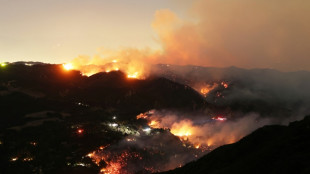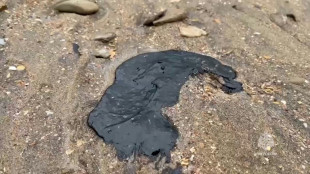

Culling controversy as French wolf population falls in 2023
The estimated number of wolves in France last year was 1,003, down nine percent from the year before, environmental associations said Thursday, urging the French government to lower its quota for the number of the animals which can be killed each year.
The drop in the predator's population is the first in almost ten years, according to loupfrance.fr, a site managed by France’s biodiversity authority.
"This new estimate reinforces the finding that the species' conservation status is not good," the six conservation groups wrote.
The current quota allows for 19 percent of the French wolf population to be legally killed.
But an administrative source close to the matter —- who confirmed the 1,003 figure —- told AFP that current hunting limits would be maintained, allowing for "209 wolves" to be culled.
The percentage is "based on the estimated population at the end of the winter, which was 1,104," said the source, asking not to be named.
The number of wolf attacks is also on the rise, added the source.
For their part, agricultural groups argue culling nearly one-fifth of the predator's population is still too low to prevent what they say is a growing number of attacks on livestock.
Wolves had vanished from France but began returning in the 1990s, with farmers saying they suffered 12,000 attacks on their animals in 2022.
"For 2024, we're expecting to see an increase in the number of reports and victims," said a representative for France's sheep farmers group, Claude Font.
"If we hold at 19 percent of the estimated wolf population, we're not going to stop the number of sheep being killed," he said, calling for political action at the highest level to increase the percentage.
- 'Upsurge in poaching' -
But for League of the Protection of Birds (LPO) president Allain Bougrain-Dubourg, "wolves are being sacrificed on the altar of agricultural demagoguery".
In addition to authorised hunting, "we're seeing an upsurge in poaching and poisoning", he told AFP.
The National Wolf Group (GNL) meeting, scheduled for Friday, will bring together environmentalists, elected officials, civil servants, the agricultural industry, and hunters.
But several environmental groups pulled out of the organisation in September 2023, deeming the government's 2024-2029 wolf plan "unacceptable".
The proposition calls for increased support for farmers dealing with livestock loss from wolf attacks, simplified population culling, and an overhaul of the current counting system, which is an estimate drawn up by France's biodiversity authority.
The wolf is categorised as "strictly protected" in the European Union, but France's new plan raises the possibility of reviewing the animal's status.
In September 2023, European Commission chief Ursula von der Leyen warned that "the concentration of wolf packs in some European regions has become a real danger for livestock and potentially also for humans".
For conservation groups, however, the dip in the wolf population is a clear sign that efforts to protect the predator are falling short.
The government must "stop advocating downgrading the species’ level of protection".
S.Rovigatti--IM




